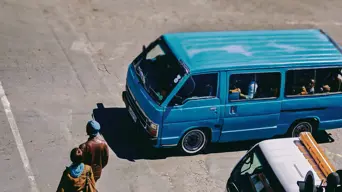'Socks money': The hidden economy that helps SA's taxi drivers survive
Minibus taxi drivers rely on income they pocket after their daily targets are met, says sociologist Siyabulela Christopher Fobosi.

Minibus taxi in Maboneng, Johannesburg. Wikimedia Commons/Shade Schutze Photography
702's John Perlman talks to the University of Fort Hare's Siyabulela Christopher Fobosi about his research.
South African motorists might have constant complaints about the minibus taxis on our roads, but the industry forms the backbone of our public transport system.
However, it operates in a legal and economic grey zone with drivers enduring brutal hours, poverty wages and constant insecurity, writes Siyabulela Christopher Fobosi in an op-ed for Daily Maverick.
The sociologist and University of Fort Hare researcher spent hours with drivers at taxi ranks in Johannesburg, to find out about their daily lives.
He highlights 'a quiet form of resistance' that has emerged amid the pressures they face, called imali yesokisi, or 'socks money'.
In conversation with John Perlman, Fobosi explains why this part of their regular income is crucial for these taxi drivers.
"The drivers operate in precarious conditions; they're not paid a living wage... so they resort to this socks money which is the money they then hide in their socks (after meeting the daily revenue target imposed by taxi owners)."
Christopher Fobosi, Senior Researcher - University of Fort Hare
Fobosi says many drivers earn less than R500 per week, despite working 12 to16-hour shifts.
Some are paid solely on commission, with income fluctuating wildly, he adds.
"This instability isn’t accidental. It is baked into the structure of the industry, designed to shift risk and cost onto workers."
Siyabulela Christopher Fobosi, Senior Researcher - University of Fort Hare
The failure of unions like Satawu to gain traction in the taxi industry highlights a deep crisis in worker representation, he says.
Fobozi emphasizes a need to formalise the industry, with government investing in 'meaningful' regulation that centres the rights of workers, not just the efficiency of transport.
"The money in the sock is a temporary fix; what drivers truly need is a future where they no longer have to hide their earnings just to survive."
Siyabulela Christopher Fobosi, Senior Researcher - University of Fort Hare
To hear more from Fobosi, listen to the interview audio at the top of the article